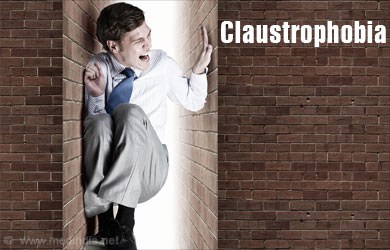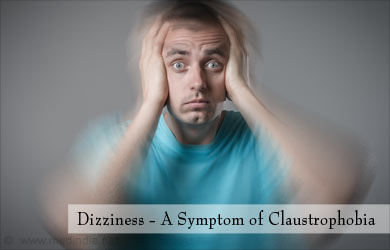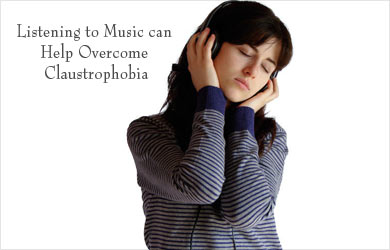- Claustrophobia - (http://www.nhs.uk/conditions/claustrophobia/pages/introduction.aspx)
What is Claustrophobia?
Phobia can make even the strongest person weak. Have you ever felt anxious about being in confined spaces like inside a trial room or public toilet where it has restricted means of entry and exit? Then you may be suffering from Claustrophobia i.e., extreme fear of confined spaces.
Claustrophobia is an anxiety disorder and affects 15% to 37% of people around the world. The word claustrophobia comes from the Latin word claustrum which means ‘a shut in place’ and Greek word phobos meaning ‘fear’. A person with claustrophobia may experience mild to severe anxiety when in confined spaces such as an elevator or a crowded room. Even if you avoid confined spaces and limit your entry into such places, you may have claustrophobia.

What are the Causes of Claustrophobia?
Claustrophobia particularly develops during childhood or teenage. There are some particular situations, which may put a person to experience claustrophobia like:
- Elevators or Lifts
- Trial room in shops
- Public toilets
- Subways
- Tunnels
- Aeroplanes
- Parking spaces
- Hotel rooms
- Car with auto-lock systems
- Crowded malls
- Automatic car washes
- Imaging devices like MRI scan
A person may feel afraid to stay or enter into such places and may also experience severe panic when entered. They may fear losing oxygen and think that there will be some danger in such spaces.
What are the Symptoms of Claustrophobia?
Panic attacks are the first thing a person may experience at a particular place. It has two key symptoms: fear of restriction and fear of suffocation. Fear of restriction refers to the fear of being trapped in a confined space and fear of suffocation refers to the fear of losing oxygen in the confined space. Panic attack increases the anxiety levels and in turn triggers many symptoms such as:
- Excessive sweating
- Increased heart beat
- Breathing faster
- High blood pressure
- Difficulty in breathing
- Nausea
- Confusion
- Anxiety
- Fear of death
- Urge to visit the toilet
- Dizziness

How do you Diagnose Claustrophobia?
If you experience some symptoms like panic attacks or fear of being trapped inside a particular place, then you should consult your general physician regarding this. The doctor may ask you to describe the symptoms, which you experienced and also will analyse whether you have any other type of anxiety disorders.
There are certain methods to diagnose claustrophobia such as:
- Claustrophobia Questionnaire: It was developed in 1993 and was modified in 2001. It consists of 12 items assessing three mood dimensions such as valence: good mood, bad mood; alertness: awake, tired; calmness: calm, nervous). It determines whether the patient''s anxiety is driven by a fear of suffocation or restriction.
- Claustrophobia Scale: It was developed in 1979 and consists of 20 questions that help in assessing the anxiety levels. It tends to be an effective method of diagnosing claustrophobia.
How do you Treat Claustrophobia?
For many people thinking that their phobia is irrational and needs treatment will increase their anxiety levels even further. But phobia can only be treated by overcoming their fear by dealing with it. Psychologists suggest one or more of the following methods to treat claustrophobia:
- Cognitive Behavioral Therapy: It is a recognized therapy for most anxiety disorders. It proves to be effective for treating disorders that occur due to misconceptions. A person with claustrophobia generally fears more by imagining that lifts are dangerous but instead through this therapy the usefulness of it will be explained and this will in turn help in combating claustrophobia.

- In vivo Exposure: It treats people by exposing them to the fear itself, such as making them be in confined spaces. It helps in overcoming their fear by exposing them to the same fear. It is usually done in progression from lower levels to higher levels of exposure.
- Interoceptive Exposure: In this method internal sensations within a patient are recreated in a controlled environment. It is a less intense form of in vivo exposure.
- Medications: Beta-blockers and anti-depressants are prescribed to treat claustrophobia. They relieve symptoms of accelerated heart beats during panic attacks. Alternative medicines like homeopathic medicines are also prescribed to manage panic and anxiety.
- Breathing Exercises: Taking deep breaths, meditating and doing muscle-relaxing exercises are found to be effective in dealing with negative thoughts and anxiety.
- Counter-Conditioning: In this method, specific relaxation and visualization techniques are taught to a person when experiencing phobia-related anxiety. This is also known as systematic desensitization.
How do you Prevent Claustrophobia?
There are no specific methods to prevent claustrophobia. People with claustrophobia need to cope with panic attacks, which they experience in an uncomfortable situation. The panic attack usually lasts for half an hour. Therefore, one should not panic and if driving they should park the car immediately.
One should not allow negative thoughts to enter their mind such as I’m going to die and also should not feel that they are in danger. Instead, they have to relax and take a look at the surroundings. One must browse through the decor, look at items and talk to other people.
Support from family and friends is crucial for people suffering from claustrophobia. A person getting treated to overcome a phobia may find it challenging and will need the support and care from people. Psychotherapists may ask the family members or friends to attend certain sessions to support the person seeking treatment.
Health Tips
These are some tips to follow if you find yourself in an uncomfortable situation:
- Relax yourself
- Focus on the surroundings
- Avoid deep breathing
- Be positive
- Chat with people
- Don’t overthink
- Listen to music

- Count on numbers
- Distract Yourself









